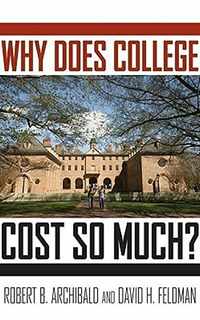- Curated in The best books I read in 2013
The title is a question that seems to get more attention every year. The authors are good about not pointing fingers but instead talking about how America’s labor market affects the cost of college. My view is that as long as there’s a scarcity of college graduates, a college degree will be quite valuable. So people will pay more to get one. And if they will pay more, then colleges and universities—whose labor is provided mostly by people who paid a lot for their own degrees—can ask for more. Until you get an excess supply of graduates, then you don’t really get any price competition.
What’s the answer? Archibald and Feldman lay out a number of policies that could help. I also think technology can help control costs by improving distance learning. Colleges and universities can also do a lot to root out inefficiencies and duplication. (How many physics courses should be taught in, say, Chicago? Could some be consolidated?) This book is a useful introduction to a complex problem.
